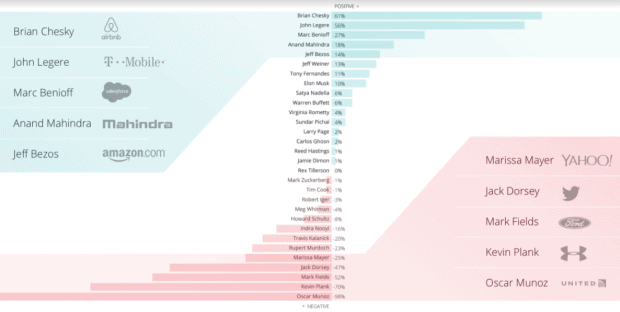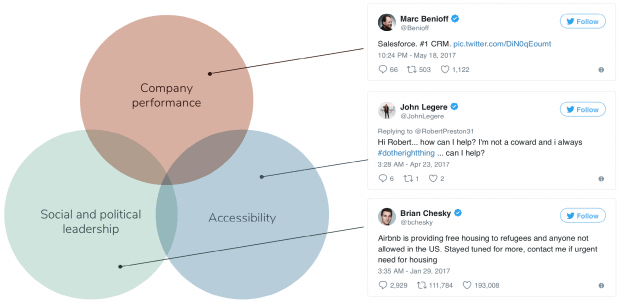CEOs of the world’s leading companies have a global influence that stretches beyond their own business and commercial interests. The general public is increasingly looking to the people steering some of the largest companies in the world for their views on political and social issues. In a Financial Times article published last August, Rana Foroohar describes today’s chief executives as “transnational leaders” who face a growing expectation, from both investors and the public, to speak out on issues.
Given this growing public expectation, our team at BrandsEye decided to apply our combination of machine learning algorithms and human intelligence to assess public sentiment towards executives on Twitter. Rather than using the typical financial indicators that so often inform these indices, our analysis was based on the unsolicited views of Twitter users. We’ve found that if mined correctly, Twitter provides a good indicator of how the general public really feels. This is something we discovered in our predictions of both Brexit and Donald Trump’s 2016 election victory.
Our list of 30 CEOs was derived from an expansive compilation of executive rankings that included Forbes, Fortune and the Harvard Business Review. In order to qualify for our analysis, an executive had to have a minimum of 40 000 tweets about them between June 2016 and May 2017. To achieve our resulting 95% confidence level with a 2% margin of error for the data, we distributed samples of conversation about each CEO to a crowd of vetted and trained local language speakers. Each post was then coded and verified by multiple crowd members, who assessed the sentiment of each post. BrandsEye’s crowd vetting process adds a layer of accuracy to our data as algorithm only approach typically fail to pick up on the nuances of human conversation such as slang and sarcasm.
Such an exercise has its limitations. For one, there are a great many high performing executives who don’t use social media at all or who simply don’t have the volumes of conversation about them as others do. Our list doesn’t proclaim to be an exhaustive ranking of the best business leaders but rather an indication of which executives are using Twitter effectively and being spoken about the most.
Top ranking CEOs: open to feedback and vocal about global issues
The top three ranking executives, Brian Chesky (Airbnb), John Legere (T-Mobile) and Marc Benioff (Salesforce) were viewed positively for being leaders of successful companies but more interestingly, as being accessible communicators that displayed leadership on social and political issues.
Top performing executives’ tweets about their companies’ success significantly increased positive sentiment towards them. It’s no surprise that the highest-ranking CEOs all have their own personal Twitter accounts and positioned themselves as responsive and open to feedback. John Legere was by far the most accessible executive, as half of his tweets were replies to T-Mobile customers. His strategy of openness had great appeal, as he self-admittedly called his competitors out on their “BS” and made himself available to customer complaints. Similarly, 80 percent of Brian Chesksy’s tweets where replies to public interactions. Chesky encouraged interaction by asking for public input for new Airbnb products.
Earlier this year, Salesforce’s Marc Benioff, who ranked third on the index, told the Financial Times that “CEOs have to be responsible for something more than their own profitability. You have to serve a broader group of stakeholders … and when politicians don’t get things right, corporate leaders have to act. That’s a big shift.” There’s little doubt that the election of Donald Trump has propelled a new trend in chief executives publicly asserting themselves on social and political issues. Leading executives distinguished themselves by speaking out in support of LGBTQ rights, refugee rights and job creation.
Most of the positive conversation about Brian Chesky related to his offer to arrange free housing for those affected by President Trump’s travel ban. On January 29th, following the introduction of Trump’s executive order, Brian Chesky tweeted that Airbnb would provide such accommodations. The public response to his offer was overwhelmingly positive and he was particularly praised for standing up to Mr. Trump.
Marc Benioff’s opposition to Texas Governor Greg Abbot’s efforts to pass discriminatory LGBTQ legislation was a driver of positive sentiment toward the Salesforce boss. Mr. Benioff’s tweets, including an image of the open letter to Greg Abbot that he signed together with Sundar Pichai, Tim Cook, Virginia Rometty and Chuck Robbins, received more engagement than any of his tweets about the success of the Salesforce business.
How the bottom CEOs got it wrong
The lowest ranking executives’ sentiment scores were driven by a perception that they were inaccessible, running underperforming companies, and were not speaking out on social and political issues. As it happened, four of the bottom five CEOs saw their company’s share prices drop significantly during the period we analyzed.
Former Yahoo CEO, Marissa Mayer, was heavily scrutinized for the underperformance of Yahoo. Under Armour Chief Executive Kevin Plank’s very public support of President Trump in February was the main contributor to his negative sentiment score. Before Plank joined Trump’s advisory board in January 2017 and then publicly praised the president for being “pro-business” and a “real asset for the country,” there was very little Twitter conversation about him at all.
United Airlines’s Oscar Munoz delivered a wonderful example of how a poorly managed crisis can hurt even those executives considered expert communicators. In March, Oscar Munoz was awarded PR Week’s Communicator of the Year. A little over a month later, an incident involving the removal of a passenger from a United Airlines flight became the main driver of a negative sentiment score. Following the incident, Oscar Munoz’s statement, shared on United Airlines’ Twitter profile, was heavily criticized for being tone deaf. Munoz, not having his own Twitter profile, may have driven the perception that he was less accessible than other CEOs. With no Twitter profile of his own, Oscar Munoz was unable to respond to public engagements about the matter, and the public was not able to tweet directly at him. This created a digital distance that all the top executives managed to bridge through regular public interaction.
CEOs and the public: Setting a precedent in the age of social media
The digital distance between executives in Silicon Valley and consumers in Melbourne or Dallas has been bridged by social media. Public opinion, democratized by the rapid spread of platforms like Twitter, is an important part of the decisions that leading executives make to help drive the success of their companies.
Executives at the top of the index, like Brian Chesky, are savvy to this development and already use Twitter for customer feedback. Brian Chesky’s interaction with people on Twitter is an important gesture of accessibility and a good example for other CEOs to follow. However, reading through hundreds of replies is ultimately an impractical way for a CEO to get a sense of what people think of them and their company. The answer lies in analysis of big sets of data from social media. Unlike traditional polling methods and surveys, social media offers real time and ongoing access to the unsolicited opinions of millions of people around the world. The availability of new opinion mining techniques combining human contributors with machine learning solves the challenge of converting large volumes of unstructured social media data into organized, decipherable insights.
Whether chief executives choose to keep their finger on the pulse of public sentiment or not, the public will continue to look to them for leadership on the most important issues facing the world – from climate change to the future of work. Those business leaders who chose to ignore Mr. Benioff’s comment – that they ought to be responsible for something more than their own profitability – may soon find that public sentiment toward them and their business takes a plunge.
Like this article? Subscribe to our weekly newsletter to never miss out!







